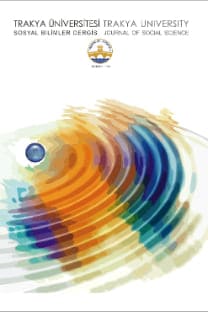SÖMÜRGE SONRASI BENLĠĞĠ ANLATMAK: ASSIA DJEBAR’IN FANTAZYA’SI
Bu çalışma, Cezayirli feminist yazar ve film yönetmeni Assia Djebar‟ın Fantazya (1985) adlı otobiyografik/tarihsel anlatısı üzerine yapılan postkolonyal bir okumadır. Fantazya‟da, Djebar farklı türden metinleri biraraya getirir: Fransa‟nın Cezayir sömürgesine dair “resmi” kayıtlarını alarak, farklı katmanlardan oluşan anlatılarla yeniden yazar. Bu anlamda metin üç anlatı düzeyi içerir: Cezayir‟in 1830‟daki yenilgisine dair Fransız askerleri ve gazetecileri tarafından tutulan kronikler; 1950-1960 arasındaki bağımsızlık savaşına katılan Cezayirli kadınların deneyimlerini geriye dönük olarak anlattıkları sözel tarih kayıtları; ve yazarın kendisinin sömürge altındaki Cezayir‟de büyüme deneyimi. Bu çok katmanlı metinde, Djebar hem Cezayirli kadınların Fransız sömürgesine karşı verdikleri bağımsızlık savaşındaki hem de ulus-devlet sürecindeki rolünü temsil etmeyi amaçlar. Ne sömürge dönemi resmi Fransız kayıtları ne de bağımsızlık sonrası ulusalcı retorik kadınların bu süreçteki rolünü hakkıyla teslim etse de, Djebar‟ın kişisel anlatısı ve kadınların sözlü anlatıları, sömürgeci ve ulusçu anlatımların kontrapuanik bir şekilde okunmasına olanak sağlar. Bu makale, Fantazya‟nın bir yandan sömürgeci şiddete diğer yandan da sömürge karşıtı mücadelenin kadınları sessizleştirme sürecine vurgu yaparak, hem resmi sömürgeci paradigmaları hem de bağımsızlık hareketine katılan Cezayirli kadınlara dair patriyarkal okumaları sorguladığını iddia eder.
NARRATING THE DECOLONIZED SELF: ASSIA DJEBAR’S FANTASIA
This study presents a postcolonial reading of Algerian feminist writer andfilm director Assia Djebar‟s autobiographical/historical narrative Fantasia An AlgerianCavalcade (1985). In Fantasia, Djebar juxtaposes different kinds of texts with each other:she takes the “official” records of the French colonial conquest of Algeria, which is itself arewriting of a historical fact, and she rewrites it by complicating that narrative by layers ofvoices. The text includes three narrative layers: chronicles of the Algerian defeat of 1830recorded by French soldiers and journalists; oral accounts of rural Algerian women whoretrospectively narrate their participation in the independence struggle during 1950s and1960s; and the author‟s own experience growing up in colonial Algeria. In this multilayeredtext, Djebar aims to represent a vignette of colonial Algeria, women‟s involvementin the independence war against the French colonial power, and women‟s role in the nationbuildingstage afterwards. While the official accounts of the French colonial occupation ofAlgeria and the nationalist rhetoric afterwards do not fully acknowledge the essential roleof women, Djebar‟s personal narrative and the oral histories of women allow the reader tomake a contrapuntal reading of the colonial and nationalist histories. This study makes the argument that by emphasizing the various levels of resistance to colonial violence andsilencing in anticolonial nationalist struggle, Fantasia challenges both the colonial officialparadigms of the Algerian independence movement and the patriarchal understandings ofthe Algerian women who participated in the independence movement.
___
- Achebe, C. (1964). “The Role of the Writer in a New Nation,” Nigerian Magazine, 81, , pp. 157-60.
- Alloula, M. (1992). The Colonial Harem. Trans. Myrna Godzich and Wlad Godzich. Minneapolis: University of Minnesota Press.
- Blair, D. S. (1993). “Introduction.” Fantasia An Algerian Cavalcade. Trans. Dorothy S. Blair. Portsmouth, Nh: Heinemann.
- Cooke, M. (1993). “WO-man, Retelling the War Myth.” In M. Cooke and A. Woolacott (Eds.), Gendering War Talk (pp. 177-204). Eds. NJ: Princeton University Press.
- Djebar, A. (1992). Women of Algiers in Their Apartment. Trans. M. Jager. Charlottesville: University Press of Virginia,.
- Djebar, A. (1993) Fantasia An Algerian Cavalcade. Trans. Dorothy S. Blair. Portsmouth, NH: Heinemann, .
- Donadey, A. (2000). “The Multilingual Strategies of Postcolonial Literature: Assia Djebar‟s Algerian Palimpsest.” World Literature Today, 74.1, pp. 27- 36.
- Fanon, F. (1968). The Wretched of the Earth. Trans. C. Farrington. New York: Grove Press.
- Ghaussy, S. (1994). “A Stepmother Tongue: „Feminine Writing‟ in Assia Djebar‟s Fantasia: An Algerian Cavalcade.” World Literature Today, 68.3, Summer, pp. 457-462.
- Jayawardena, K. (1986). Feminism and Nationalism in the Third World. London: Zed.
- Moghadam, V. (Ed.). (1994). Gender and National Identity: Women and Politics in Muslim Societies. London: Zed.
- Mohanty, C T, Russo, A. and Torres, L. (1991). Third World Women and the Politics of Feminism. Bloomington: Indiana University Press,.
- Thiong‟o, N. (1986). Decolonising the Mind: The Politics of Language in African Literature. London: James Currey.
- Parker, A, Russo, M, Sommer, D, and Yeager, P. (Eds.). 1992. Nationalisms and Sexualities. New York and London: Routledge .
- Said, E. (1994). Orientalism. New York: Vintage Books.
- Said, E. (1994). Culture and Imperialism. New York: Vintage Books.
- Spivak, G. C. (1994).“Can the Subaltern Speak?” In P. Williams and L. Chrisman (Eds.). Colonial Discourse and Post-Colonial Theory (pp. 66- 11). New York: Columbia University Press.
- Yuval-Davis, N. and Anthias, F. 1989.Woman-Nation-State. London: Macmillan.
- ISSN: 1305-7766
- Yayın Aralığı: Yılda 2 Sayı
- Başlangıç: 2000
- Yayıncı: Trakya Üniversitesi Sosyal Bilimler Enstitüsü
Sayıdaki Diğer Makaleler
CUMHURİYET DÖNEMİ BALKAN GÖÇLERİNİN SOSYAL POLİTİKA AÇISINDAN ETKİLERİ
SOSYAL PAZARLAMADA GERİLLA UYGULAMALAR
İRAN REJİMİ ve EKONOMİK PERFORMANSI İLİŞKİSİ ORTA DOĞU’DA BARIŞ MÜMKÜN MÜ
Trakya'da Yok Olmaya Yüz Tutmuş Bir Meslek: Çömlekçilik
NARSİSİSTİK KİŞİLİK ENVANTERİ AÇISINDAN ÖZÇEKİM YAPMA TUTUMU ÜZERİNE BİR ARAŞTIRMA
OTİZMLİ ÖĞRENCİLERE KENDİNİ TANITMA BECERİSİNİN ÖĞRETİMİNDE VİDEOYLA MODEL OLMANIN ETKİLİLİĞİ
Galibiye ÇETREZ ARICAN, Yeşim FAZLIOĞLU, Selen TEZCAN
KIYI EROZYONUNUN BELİRLENMESİNDE 137Cs RADYONÜKLİDİNİN KULLANIMI: URLA YARIMADASI KIYILARI ÖRNEĞİ
M. Kirami ÖLGEN, Filiz GÜR FİLİZ, Doğukan Doğu YAVAŞLI, Mehmet TARAKÇI
NARSİSİSTİK KİŞİLİK ENVANTERİ AÇISINDAN SELFİE ÇEKME TUTUMU ÜZERİNE BİR ARAŞTIRMA
